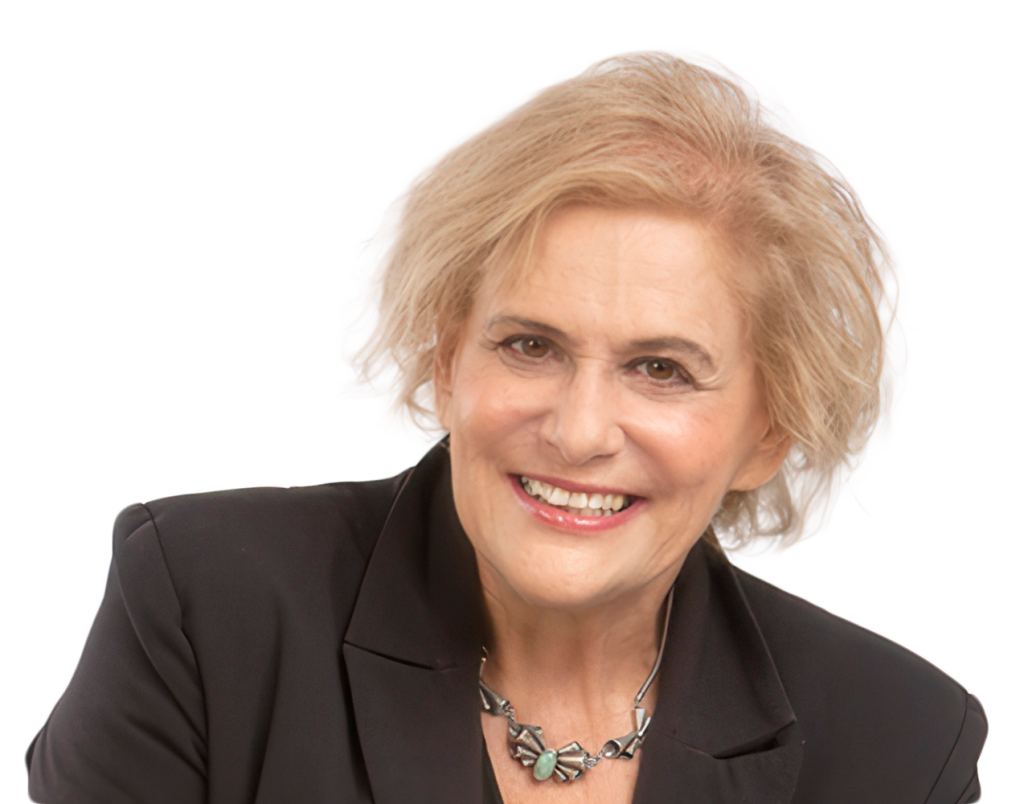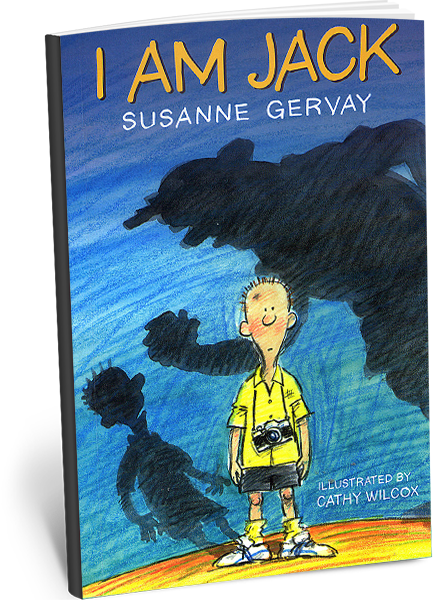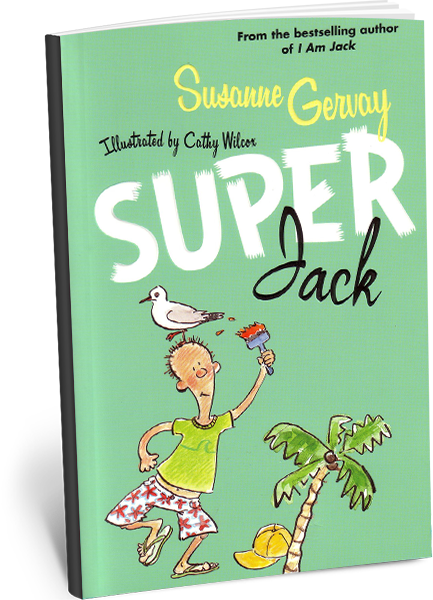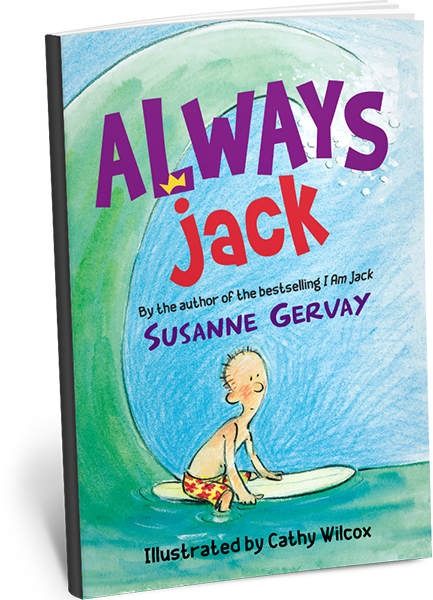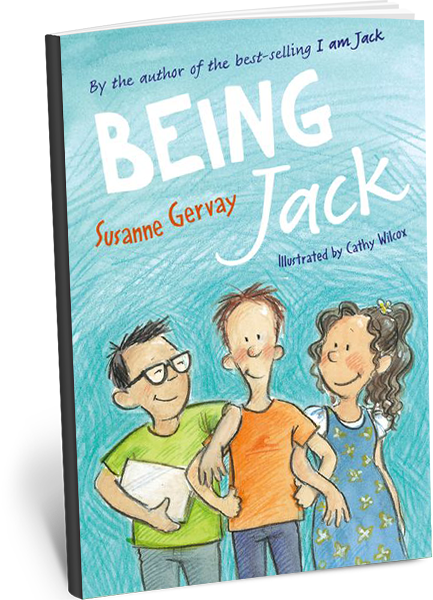Introducing the I Am Jack Series
The I Am Jack series by Susanne Gervay is a heartfelt and powerful collection of stories that follow the journey of Jack, a funny, creative, and resilient young boy navigating the challenges of growing up. Through themes of bullying, family, friendship, and self-discovery, Jack’s world unfolds in an honest and relatable way, making these books a must-read for children, parents, and educators alike. From standing up to bullies to embracing change within his blended family and tackling personal struggles with courage, Jack’s story is both deeply moving and empowering. Filled with warmth, humor, and real-life lessons, the I Am Jack series is a celebration of resilience, kindness, and the power of standing together.
About Bullying
What is bullying
What do you consider “bullying” to be?
BULLYING IS NOT TEASING, CASUAL NAME CALLING, A HIT ON THE ARM, A BIT OF ROUGH AND TUMBLE be it in the school yard or on SMS.
Most kids experience and engage in some of this behaviour. Bullying is when teasing, punching, name calling isn’t funny anymore. When it’s used to intimidate and isolate another child. It’s when a bully with peer group support attacks the very basis of a child’s self esteem until a child is powerless, feeling there is no support from adults, the school and friends A child becomes a victim, develops low self esteem, depression and can show behaviours ranging from withdrawal, aggression, missing school and a feeling of no worth.
What age is bullying a real concern?
Bullying occurs at all ages. However from around 7 years of age children become more involved in unsupervised group behaviour. As parents gradually withdraw from the schoolyard, children are more independent and bullying becomes more prevalent. At this stage of development, children have neither the experience or emotional development to understand the impact of bullying on others or how to deal with bullying when they are targeted. Children especially need parental guidance at this stage.
Before 9, there tends to be parent presence and intervention. After 15, adolescents are developing their identity which includes understanding of their behaviour on others. However, the power of peer group behaviour can have a devastating impact on a young adult who has endured long term bullying.
Are boys or girls bullied more? Are the ways in which they are bullied different? Is it worse for boys or girls?
Boys and girls are both bullied. Boys tend to be more obvious with physical actions while girls tend to use verbal and passive aggressive actions including SMS and technology. Both engage in isolating their victims. Cyber bullying has escalated the impact through broadening the peer group attack while camouflaging the perpetrator.
Girls who are bullied, can have an advantage in countering bullying when compared to boys. Girls’ verbal skills and communication skills mean they have chances to link into another group of girls. Boys tend to have less options.
Boys who are late physical developers tend to be more victimised than girls who are late developers. The common characteristics of children who are bullied are sensitivity and vulnerability. Importantly children who become isolated from the group through sickness, absences, starting school mid year and any event triggering isolation, become key targets.
Bullying is devastating for both boys and girls. However boys can have less resources to counter bullying as they cope with stereotypical expectations of male behaviour. There can be expectations that boys have to handle bullying by themselves because they are boys. Yet when bullying becomes entrenched no child can handle it alone. As boys get into their teens, they are less likely to speak to anyone about the bullying.
As a parent, what is the first thing you should do if you find out that your child is being bullied?
Observe your child’s behaviours including:-
- fall in school performances
- dropping out of activities
- friends not coming over
- developing headaches and similar
- trying to miss school
- getting into trouble at school
- change in activities
- changes in emotional behaviours such as anger, crying, silence
- spending time alone
Make special time for your child which is not a parent-child talk. Rather a natural activity where your child is comfortable. Go for a walk together or take your child out to a cafe – time when the parent is not preoccupied and the child feels special.
Give your child concrete positive experiences. For example, if they like the movies, take them out or with the family or another child. Start to build experiences which enhance the child’s role as a valuable member of the family.
This is trust-time. It is a concrete way to show support, love and belief in your child.
Communicating will depend on the child’s personality, family interactions, the severity and longevity of the bullying. However each activity works towards rebuilding a child’s self esteem and trust, building strategies against bullying.
The communication must not artificial, confronting, the parent dictating the conversation.. It should be safe talking. Communication becomes more difficult if a child is seriously being bullied, as they are in personal crisis and usually afraid to speak. Positive experiences can start to break down the fear:-
- building friendships with other children through inviting them to events/ your home;
- getting into sport and similar;
- speaking to the teacher and/or principal;
- providing a parent presence in dangerous times such as before and after school;
- getting older sibling support.
There are many possible strategies. Parents can make bullying less likely to happen through:-
- Supporting friendship groups with invitations to play for younger children
- Making the home available to teenage friends
- Team activities from sports to drama groups to youth groups
- Being aware of changes in your child’s behaviour and listening to issues before they escalate
- Family and child-parent activities
- Ensuring young people have strong social networks
- Discussing bullying with your child from all aspects including the bully, bullied, friends, bystanders, teachers, parents, school, the community.
- Engaging in story journey so children emotionally understand bullying through books like Susanne Gervay’s I Am Jack and seeing performances such as MonkeyBaa Theatre’s adaptation of I Am Jack.
- NO TO BULLYING becomes a parent-child-school commitment.
Bullying is about isolating and then victimizing young people.However it is important to realize that bullies are not evil monsters. Many kids will bully at some time. Often bullying occurs because children do not understand the impact on the victim, they are having fun, they are in a group, peer group influence, feeling good about their own power, leading in the wrong way. There are many reasons young people bully. It’s important that every child accepts responsibility for bullying – the bully, the bullied, the bystanders, friends.
A safe home and school environment is essential for healthy development.
What do you do if you find out that your child is the bully?What do you do if you find out that your child is the bully?
If your child is the bully, action depends on the severity of the bullying, the child’s personality and relationships in the family and similar factors.
There should already be conversations, books, parent-child chats during normal family activities that emotionally engage the child in the impact of their bullying others. Younger children are more responsive to being told not to bully another child. They are likely to apologise and follow parental guidance on establishing a non-bullying relationship with another child. However as they become teenagers, they are less likely to respond to a parent through being told. It is important to have a sense of fair play established BEFORE children go to high school.
If bullying of another child is severe, then the first priority is to ensure the bullied child is safe and the bullying must be stopped immediately. There can be punishments with withdrawal of privileges. However for your child to not be a bully, there needs to be an emotional understanding and belief by the child that bullying of others is wrong and there are also consequences for bullying behaviours on the bully.
Suggested actions:-
- Do not make excuses or joke or accept your child bullying another.
- Have a serious talk about the bullying and its impact on the victim
- NEGATIVE consequences for bullying such as withdrawal of privileges
- Work together to find resolutions
- Reward your child for POSITIVE actions such as apologising, inclusive behaviours, getting other kids who bully a child to stop
The real way to stop bullying escalating is through a school community approach where parents, teachers and children are all cooperative partners in creating a safe community.
Primary school is a time to reach children before they go to high school and face adolescence issues. Story journey is a powerful way to emotional engage primary school children so they feel the impact of bullying, recognize their own behaviours and determine how they want to act.
Relating to a story or being emotionally engaged facilitates learning. Readers become fellow travelers in a story journey. Lining, Phillips and Burton (1997) in a literature based approach to bullying rationalize that a story can allow the reader to empathize with situations that they may not have experienced, can provide the reader with reassurance that other people experience the same problems they do themselves, and can provide a situation where topics can be explored through a third party – the characters in the book. By taking students on a journey with Jack, attitudes, feelings and strategies about bullying can be explored and discussed in a non threatening way.”
I Am Jack Series
I Am Jack
Jack’s world is changing—his mum has Rob, but is Rob just for her or could he be a real dad? Then there’s Leo, Rob’s son, and Jack’s own dad, who never visits. With Nanna aging and family dynamics shifting, Jack learns that love, patience, and understanding can hold everything together.
SuperJack
Jack’s family is changing, and he’s struggling to figure it all out. His mum has Rob, but could he be a real dad? Then there’s Leo, Rob’s son, and Jack’s own dad, who never visits. With Nanna aging, Jack learns that love, patience, and understanding help make sense of it all.
I Am Jack
Jack’s life is great—awesome friends, funny jokes, and cool inventions. But things get complicated. Nanna’s getting older, Anna makes his face go red, and his mum’s wedding is taking over everything. Then comes the biggest shock—his mum has cancer. With love, hope, and courage, Jack faces life’s toughest moments.
Being Jack
Jack is thriving in Year 6—loving photography, surfing, and his chaotic family. But when his best friend Christopher is bullied, Jack knows he can’t stay silent. He’s been there before. In a high-stakes football match, Jack must decide: stand by or take a stand. True heroes show up for others.



